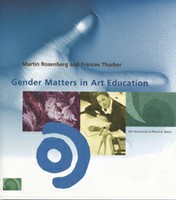Art historian publishes book on teaching art to promote gender equity; new manual helps youth in foster care

Martin Rosenberg’s Gender Matters in Art Education (Davis Publications, 2006), coauthored by Frances Thurber of the University of Nebraska–Omaha, spotlights gender inequities in the art world and offers suggestions on how teachers may present a more balanced perspective for girls and boys alike.
“Art teachers are dealing with gender issues, whether they address them consciously or not,” said Rosenberg, a leader in art education reform. “Gender shapes our view of art and art shapes our views of gender. Since the art classroom is a place where children learn to understand and to express their unique perspective through the visual, it provides excellent opportunities to promote gender equity, while teaching art in a rich, comprehensive fashion.”
“Gender Matters,” designed as a resource for art educators at all levels, addresses key issues of theory and practice related to gender and the arts and includes ideas for content selection, a discussion of many aspects of curricula, and a list of resources. The authors stress that to deal with gender in a substantive way; it is not enough for art educators to teach only art’s formal and technical aspects.
“Instead of teaching just the ‘how to,’ students should also be learning ‘the what’ or ‘the why’ of art. Artists make art to say something important about the relationship between people and the world,” Rosenberg said. “If you don’t believe gender matters in art, why do we talk about ‘women artists,’ but never ‘men artists’? Could it be that, as in so many other professions, we automatically assume a male identity?” Rosenberg asked.
The book draws on Rosenberg’s research, teaching, and nearly 20 years of involvement in the art education reform effort catalyzed by the J. Paul Getty Trust. From 1987 to 2002, he, along with his co-author Thurber, served as key members of an interdisciplinary team shaping and implementing the Prairie Visions Project, a research and development program in comprehensive approaches to art education based in Nebraska, which was supported by the Getty and received recognition at the national and international levels.
Rosenberg also served as a member of the National Advisory Committee of the Getty Education Institute for the Arts of the J. Paul Getty Trust for seven years. During 1998-99, Rosenberg served as the Visiting Scholar, a position awarded to one person each year, at the Getty Center in Los Angeles and lectured to art educators throughout China.
Rosenberg, who received a bacherlor’s degree in chemistry from MIT, earned his doctoral degree in art history from the University of Pennsylvania. An expert on 18th- to 20th-century French art, feminist art history, and the role of art history in art education, Rosenberg serves as chair of the fine arts department on the Camden campus.
- Cathy K. Donovan
School of Law-Newark develops manual to guide those
transitioning from foster care

“While there is some information for the providers of the resources that exist for these young people,” noted Clinical Professor Randi Mandelbaum, director of the clinic, “none of it is written for the youth themselves.”
Most foster youth are unaware of available services and resources such as housing, health insurance, clothing, and vouchers for postsecondary education, and that DYFS is mandated to provide the services until they are 21. The manual was edited by Mandelbaum and CPAC chair Lila Bernstein and revised after focus groups with young people. Clinic students are participating in information sessions throughout the state to distribute manual to youth in the foster care system and to answer their questions.
- Janet Donohue